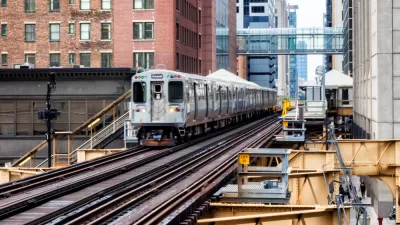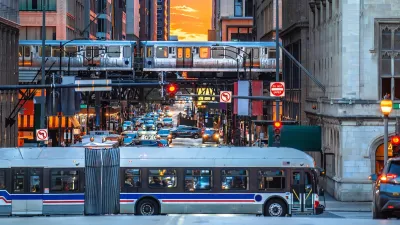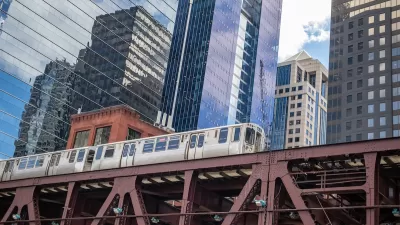Illinois transit agencies want to see changes to a law requiring them to collect half of their revenue from transit fares, arguing that low ridership and staffing shortages will lead to a massive budget gap without intervention.

The Regional Transportation Authority (RTA) in Illinois is calling on state lawmakers to change a law that requires half of the agency’s revenue to come from transit fares, citing continued low ridership after the pandemic, when emergency exemptions kept the agency afloat. Writing in Crain’s Chicago Business, Andrew Adams explains that “Last month, RTA's board approved a strategic plan that includes seeking increased funding overall to the system and developing a new model that is less reliant on fares.”
Members of the state Senate Transportation Committee said they would likely support assisting the RTS and Chicago Transit Authority (CTA), which it oversees, but expressed interest in addressing “certain reforms and issues, like safety and accessibility, that need to be addressed.”
“Beyond the long-term inequities in access, the CTA has also faced criticism from lawmakers and advocates about increased wait times for services and ‘ghost busses,’ a term to describe when a bus is scheduled to come but never does,” problems the CTA attributes to a worker shortage.
The challenges aren’t unique to the Chicago area. “Transit systems in Bloomington-Normal, Peoria, Rockford, Springfield, Champaign-Urbana, Decatur, Kankakee and DeKalb have all faced decreased ridership since the pandemic began.” According to Adams, “As of December, the combined number of trips being taken on these systems is down to 69 percent of what it was at the same time in 2019, according to data from the Federal Transit Administration.”
FULL STORY: Chicago transit looks to the state to help make up $730 million budget gap

Study: Maui’s Plan to Convert Vacation Rentals to Long-Term Housing Could Cause Nearly $1 Billion Economic Loss
The plan would reduce visitor accommodation by 25,% resulting in 1,900 jobs lost.

North Texas Transit Leaders Tout Benefits of TOD for Growing Region
At a summit focused on transit-oriented development, policymakers discussed how North Texas’ expanded light rail system can serve as a tool for economic growth.

Using Old Oil and Gas Wells for Green Energy Storage
Penn State researchers have found that repurposing abandoned oil and gas wells for geothermal-assisted compressed-air energy storage can boost efficiency, reduce environmental risks, and support clean energy and job transitions.

Private Donations Propel Early Restoration of Palisades Playground
Los Angeles has secured over $1.3 million in private funding to restore the Pacific Palisades playground months ahead of schedule, creating a modern, accessible space that supports community healing after recent wildfires.

From Blight to Benefit: Early Results From California’s Equitable Cleanup Program
The Equitable Community Revitalization Grant (ECRG) program is reshaping brownfield redevelopment by prioritizing projects in low-income and environmental justice communities, emphasizing equity, transparency, and community benefits.

Planting Relief: Tackling Las Vegas Heat One Tree at a Time
Nevada Plants, a Las Vegas-based nonprofit, is combating the city’s extreme urban heat by giving away trees to residents in underserved neighborhoods, promoting shade, sustainability, and community health.
Urban Design for Planners 1: Software Tools
This six-course series explores essential urban design concepts using open source software and equips planners with the tools they need to participate fully in the urban design process.
Planning for Universal Design
Learn the tools for implementing Universal Design in planning regulations.
Ascent Environmental
Borough of Carlisle
Institute for Housing and Urban Development Studies (IHS)
City of Grandview
Harvard GSD Executive Education
Toledo-Lucas County Plan Commissions
Salt Lake City
NYU Wagner Graduate School of Public Service





























